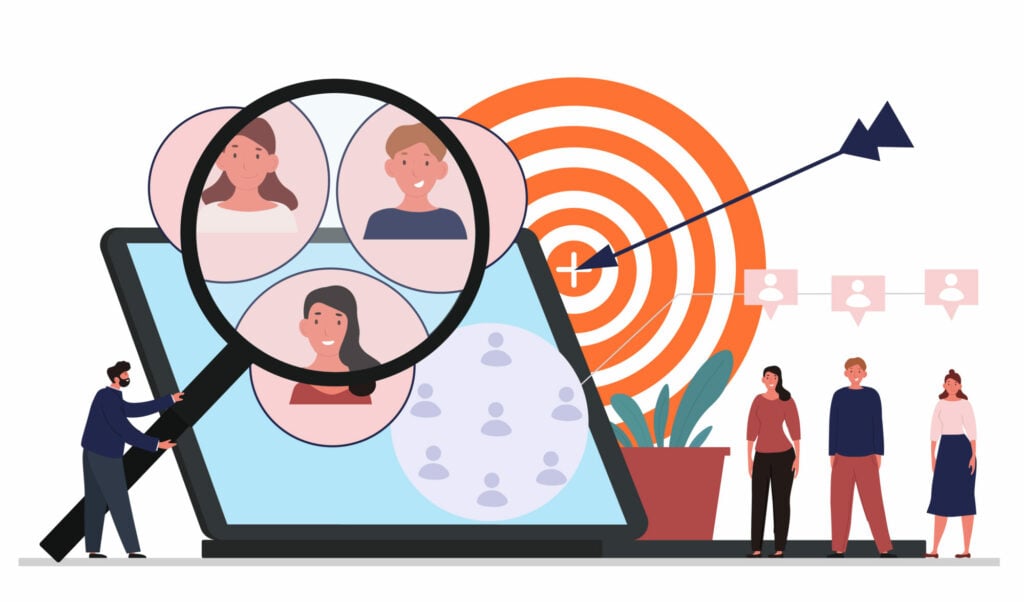In a recent blog post, I argued against the use of buyer personas in marketing efforts, particularly in B2B contexts. Jim Cota, our fearless leader—who embodies F. Scott Fitzgerald’s line that “the test of a first-rate intelligence is the ability to hold two opposed ideas in the mind at the same time, and still retain the ability to function”—agreed with the post’s thesis, he said, but wondered if we really understand buyer personas.
In the spirit of Fitzgerald’s philosophy, let’s explore the opposing view as I argue against my own blog post to see if I can understand why buyer personas, when done right, might be useful tools in modern marketing.
While a healthy skepticism about buyer personas is (mostly) warranted, I admit that they may offer some value to companies trying to understand their target audience. Such profiles could potentially provide insights that inform various aspects of business operations, from product development to customer engagement.
Using buyer personas might allow companies to create more targeted marketing messages. By examining the characteristics and motivations of their ideal customers, businesses could theoretically tailor their communication to address specific needs. B2B companies dealing with complex sales cycles and multiple decision-makers might find some use in a more nuanced understanding of their buyers, as well. Industries with high-value products or services—technology, for example, and maybe finance—could potentially use personas to more efficiently make their way through their customers’ decision-making processes. Even e-commerce businesses might leverage personas to personalize the online shopping experience.
But even in those examples above, buyer personas seem most useful in B2C contexts. Those who support the use of personas might argue that each potential customer is unique in their needs, motivations, and decision-making processes. However, critics could counter with Campbell McGrath’s sardonic observation, made in a poem about death, that “[n]o two snowflakes are alike, but every f—ing snowflake is pretty much the same.”
This tension—between individuality and uniformity, in both traits and behavior—presents a challenging paradox for marketers. While persona advocates emphasize the importance of recognizing distinct patterns in customer behavior, skeptics might argue that these patterns are often superficial, and that fundamentally, most customers within a given market segment share similar core needs and motivations.

Buyer personas may often be an unnecessary exercise in generalization, and while my doubts persist, I can admit that well-crafted personas might offer a more comprehensive view of target audiences or reveal nuances in customer behavior that might otherwise go unnoticed. Instead of dismissing them completely, perhaps I could have said that the effectiveness of buyer personas depends on their quality and implementation. Superficial or outdated personas based on assumptions or stereotypes, rather than solid research, will always be of limited value. But if they’re grounded in robust data and regularly updated, it’s conceivable that such personas might inform business strategies and decision-making. When developed thoughtfully and used effectively, these profiles can sometimes provide an advantage in understanding and serving customers.
If buyer personas can lead to understanding those customers better than your competition ever will, then they have value. Beyond demographics, what we all want is deeper insights into our prospects’ challenges, motivations, and decision-making processes. Personas also offer the necessary reminders that business is fundamentally about human connection—business is about people—and that sales teams are improved when they make empathy a greater priority. The power of imagination allows us to step into our customers’ shoes and see the world through their eyes. This fundamental act of empathy can bridge gaps in understanding, create genuine connections, and ultimately alchemize transactional relationships into meaningful partnerships that are built on trust and mutual understanding.
And however you get there, isn’t that the goal?
You might also like:
Rare Bird delivers versatile marketing and digital solutions to diverse clientele across nearly every industry. Ready to leverage our expertise to address your business needs?
Let's talk.